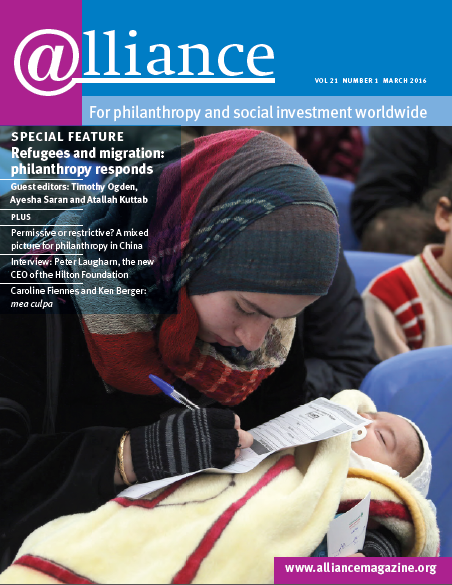Migration is – as many of the authors featured in this issue contend – an age-old phenomenon that has generated wealth, opportunities and innovation throughout history. However, the suggestion that philanthropy should encourage it as a solution to global poverty should be approached with caution.
Many of the macroeconomic arguments in favour of migration are convincing. Successfully integrated immigrants have, as the articles in this section illustrate, proved to be prominent philanthropists and the source of huge remittance revenue for their countries of origin. There is strong evidence on the productivity of migrants and countless examples of the contribution they have made to the societies in which they have settled.
But the analogy between free trade and encouraging the free movement of people risks viewing migrants as economic units. Migration provides immense opportunities but may not be cost-free for migrants or for the countries they move to or from. There can be unintended consequences, short trips that become lifetimes and sacrifices for the next generation. Michael Clemens’s article highlights the benefits of New Zealand’s Recognized Seasonal Employer programme for Tongan migrants. But other schemes may give us grounds for caution. For example, Germany’s ‘guest-worker’ scheme during the postwar decades may have helped its economy, but its benefits for those who returned to their countries of origin remain highly contested.
In addition, so much is dependent on context and how migration flows are managed. Are migrants working in less regulated sectors being exploited? Are they being pitted against ‘native’ workers? Are local services equipped for rapid demographic changes? Are migrants being successfully integrated? From a social justice perspective, the answers to these questions are as important as the bottom line.
Ultimately, philanthropy should recognize that migration is a messy, human business that may not have an intrinsic value. Instead of either encouraging or deterring migration from developing countries, foundations might be better placed to ensure its benefits are maximized for all concerned and that its challenges are addressed thoughtfully and constructively.
Ayesha Saran is programme manager – migration at Barrow Cadbury Trust. Email a.saran@barrowcadbury.org.uk





Comments (0)